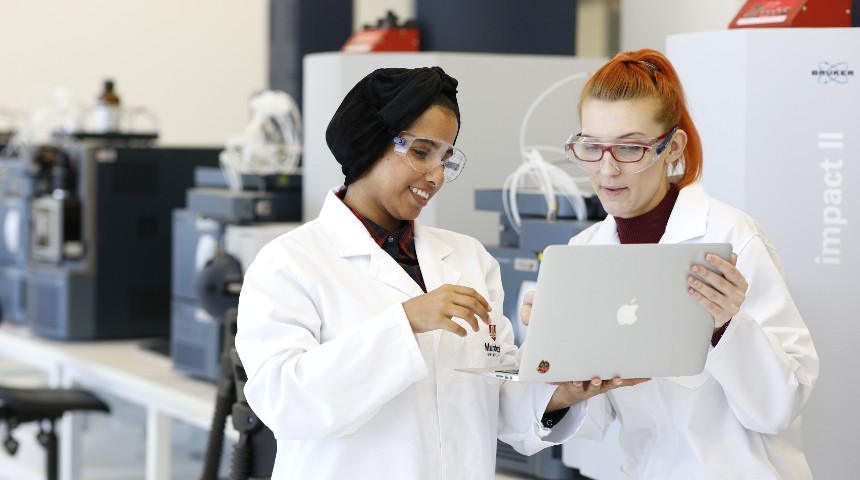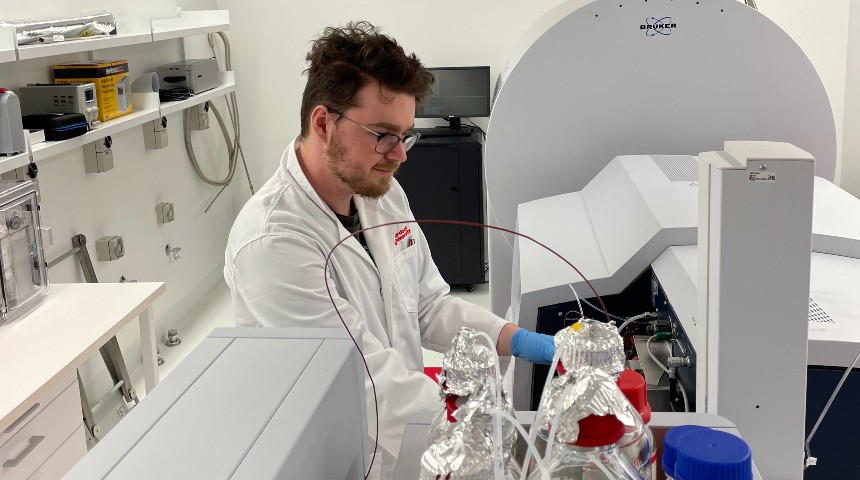
Interested in Systems Medicine? Choose from a variety of postgraduate courses and see where it takes you.
Whether you’re a recent graduate looking to further your skills or you’re ready for the next step in your career, a post-graduate degree in Systems Medicine may be for you.
What is Systems Medicine?
Systems Medicine is the study of the biology of human disease to deliver knowledge on disease risk.
Researchers review biochemical, physiological, and environment interactions within the body to analyse the health of individual patients and tailor treatment and diagnosis based on individual characteristics.
“Systems Medicine utilises cutting-edge and important laboratory technologies to understand how and why individuals respond differently to diseases, and address health challenges,” Dr Ruey Leng Loo, Premier’s Mid-Career Fellow, explains.
Led by WA’s Premier Fellow in Phenomics, Professor Elaine Holmes, Systems Medicine is delivered by the Centre for Computational and Systems Medicine (CCSM) in conjunction with the Australian National Phenome Centre (ANPC).
CCSM draws from both the technical and active research expertise of key research leaders including Dr Loo, who has an extensive background in omics science and data technology.
“A primary focus of teaching and research at Murdoch is to educate students about what is happening in the real-world, with leading researchers and guest lectures from experts in the applied fields,” Dr Loo said.
“We have lined up leading experts, including those from our research collaborators and industries, to assist the individual students on their journey into their chosen career pathway.”
What does a career in Systems Medicine look like?
A career pathway in Systems Medicine offers options within hospitals, start-ups in the biomedical sector, government advisory bodies, scientific management or data science.
You could find yourself working as a pathologist, studying diseases and their effects or as a research scientist where you’ll be managing lab-based research projects or identifying metabolic signatures that can advance our knowledge in disease prevention.
Dr Loo advises that jobs within the sector are expected to keep growing.
COVID-19 came as a surprise to us all, but it’s a reminder that we as a society have a long way to go to understanding the genetic makeup of the human body.”
Professor Holmes believes scientists who can work across multiple disciplines will have a premium value in the job market.
“We aim to provide our graduates with the skills and knowledge to tackle the big healthcare problems of the current and future generations whilst providing opportunities for them to develop specialist expertise in a range of clinical areas including cardiometabolic diseases, mother-child health and neuropathologies,” Professor Holmes said.
A rare opportunity to study Systems Medicine in Australia
Murdoch is the first university in Australia to offer post-graduate courses in Systems Medicine.
“These courses are well suited to those who have a degree in science or a relevant bachelor’s degree and were looking to upskill their knowledge.
“They have been designed to provide theoretical and practical instruction on a range of cutting-edge technologies delivered by leading experts in their fields,” Dr Loo said.
Discover how you could study Systems Medicine at Murdoch as an international student.
Gain experience in our leading ANPC facility
Students can also take advantage of Murdoch’s strong links with industry and the Australian National Phenome Centre (ANPC), led by one of the world-leading experts in metabolic phenotyping, Professor Jeremy Nicholson.
As a student you’ll have the incredible opportunity to study alongside ANPC science teams to learn how to use advanced spectroscopic and other technologies to discover new human disease biology.
Additionally, Dr Loo says that students will learn from leading researchers, guest lecturers and scientists in the field who encourage individuals to participate and make the most out of their learning.
“You’ll learn the fundamentals as well as the critical thought processes related to discovery and translation. Leading experts will also assist you in your journey to finding your ultimate career pathway.
"The ANPC is one of the most powerful metabolic phenotyping facilities in the world run by leading metabolic researchers. We’re extremely proud of this significant centre where we can address some of the world’s most challenging health issues.”
Is the Systems Medicine course right for me?
"The Graduate Certificate in Systems Medicine course provides an excellent foundation for understanding key analytical technologies and applying them in omics science," said Dr Loo.
“It is particularly well-suited to those with a degree in science or mathematics looking to further develop their career opportunities in omics science technology and data analytics.”
The 6-month full time (or part-time equivalent) Graduate Certificate in Systems Medicine course can be taken in combination with the Research Masters with Training if the students meet the entry requirements.
For those whose personal circumstances make this 18 months full-time combo course unsuitable, the student can be enrolled in the 6-month full time (or part-time equivalent) Graduate Certificate in Systems Medicine in the first instance. Once completed, this may be extended to a 12-month full time (or part-time equivalent) Research Masters with Training in Systems Medicine.
The combo courses consist of the Graduate Certificate in Systems Medicine and Research Masters with Training will provide students with systematic training in individual components of systems medicine. Students are required to undertake a real-world health-care project relevant to global health problems, offering the ability to integrate these new skills and knowledge.”
“If you want to make a difference, then there is no better time to progress your career in omics science. It’s a rewarding career path where you’ll receive satisfaction knowing that you’re contributing to solving real-world health issues,” Dr Loo said.
Testimonial from students
“I’ve really enjoyed my time here so far and compared to what I’ve heard about other universities there’s a much greater focus on practical education which is a great benefit." - Jayden Jack Heath, current student.
“I usually tell people thinking of higher education that they should take a closer look at what Murdoch University as it has a lot to offer. As a university it has grown into main player in the academic and research fields. I have had a positive experience at Murdoch University and have enjoyed my involvement with the university." - Jurissa Lang, current student.
